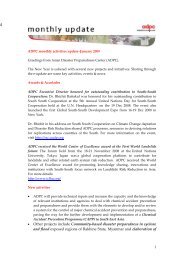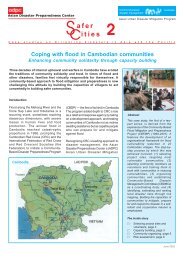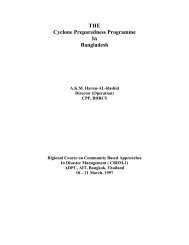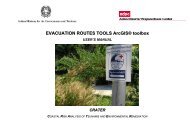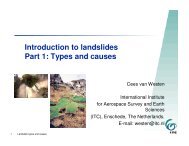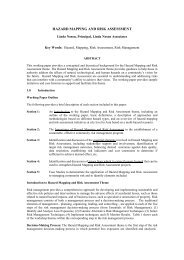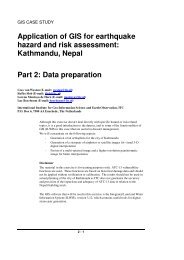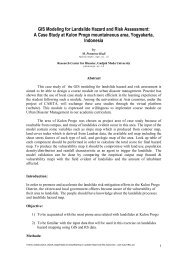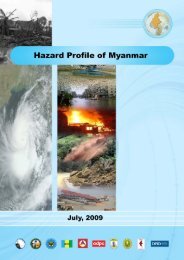community-based disaster risk management and the media media kit
community-based disaster risk management and the media media kit
community-based disaster risk management and the media media kit
Create successful ePaper yourself
Turn your PDF publications into a flip-book with our unique Google optimized e-Paper software.
chapter 2. <strong>media</strong> <strong>and</strong> <strong>disaster</strong> <strong>risk</strong> <strong>management</strong><br />
tool for public service, providing information to people in a responsible,<br />
truthful, independent <strong>and</strong> fair way.<br />
Ethical <strong>media</strong> practice can be realized by keeping in mind few key<br />
principles:<br />
Truthfulness. A <strong>media</strong> professional is expected to be well informed<br />
about <strong>the</strong> happenings around him, so as to inform <strong>and</strong> educate <strong>the</strong> public<br />
in a clear <strong>and</strong> effective way. Distorted, misrepresented, biased <strong>and</strong><br />
opinionated information violates <strong>the</strong> ethics of journalism. Exaggeration<br />
must be avoided as it can lead to racial, religious or political confl icts<br />
leading to violence.<br />
Serving Public Interest. Good <strong>media</strong> practice should be free of<br />
obligation to any interest o<strong>the</strong>r than <strong>the</strong> public’s right to know. They<br />
remain free of associations <strong>and</strong> activities that may compromise <strong>the</strong>ir<br />
integrity or damage <strong>the</strong>ir credibility, providing news <strong>and</strong> information that<br />
people need to function as effective citizens, seeking solutions as well<br />
as exposing problems <strong>and</strong> wrongdoing, providing a public forum for<br />
diverse people <strong>and</strong> views, <strong>and</strong> promoting <strong>the</strong> underst<strong>and</strong>ing of complex<br />
issues.<br />
Humanitarian approach. It is important to maintain a decent <strong>and</strong><br />
sympa<strong>the</strong>tic attitude while reporting crimes, accidents <strong>and</strong> <strong>disaster</strong>s. Use<br />
of bad language, obscene or shocking pictures should be avoided.<br />
Respect for privacy. People’s right to privacy needs to be respected<br />
by <strong>media</strong> professionals. However, this should not be an obstacle to hold<br />
public servants like politicians or o<strong>the</strong>r individuals/entities accountable<br />
for <strong>the</strong>ir actions.<br />
Integrity. Refuse gifts, favors, fees, free travel <strong>and</strong> special treatment,<br />
<strong>and</strong> shun secondary employment, political involvement, public offi ce<br />
<strong>and</strong> service in <strong>community</strong> organizations if <strong>the</strong>y compromise journalistic<br />
integrity.<br />
Honoring <strong>the</strong> Sources. Media professionals owe a responsibility not<br />
only to <strong>the</strong> public but also to <strong>the</strong> sources of information. If required <strong>the</strong>y<br />
need to maintain confi dentiality of sensitive information <strong>and</strong> avoid any<br />
action that would compromise <strong>the</strong> safety <strong>and</strong> security of <strong>the</strong> sources.<br />
33



